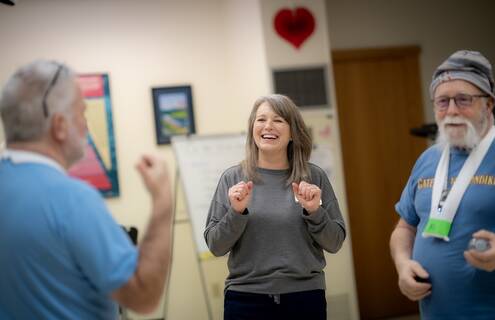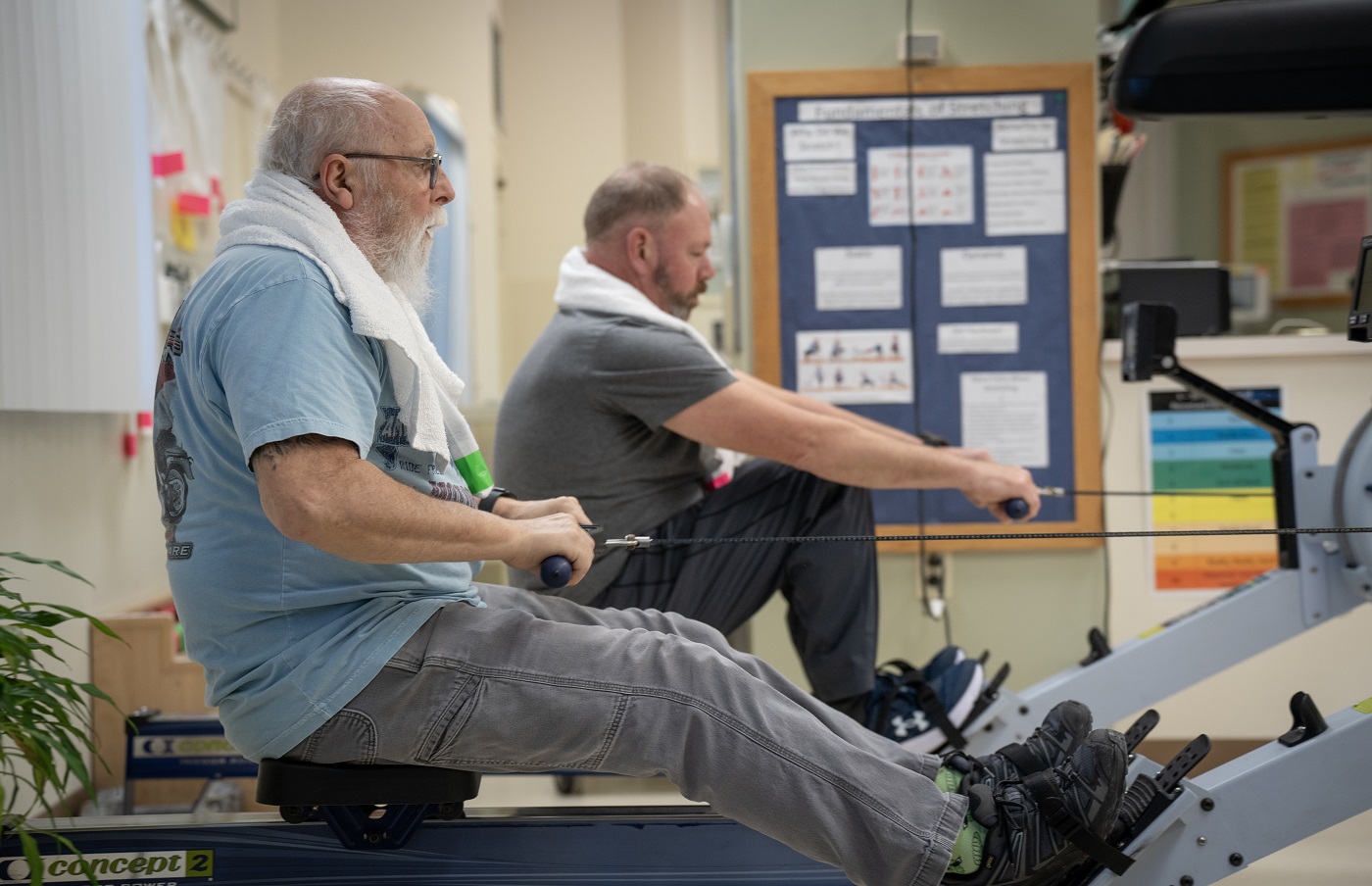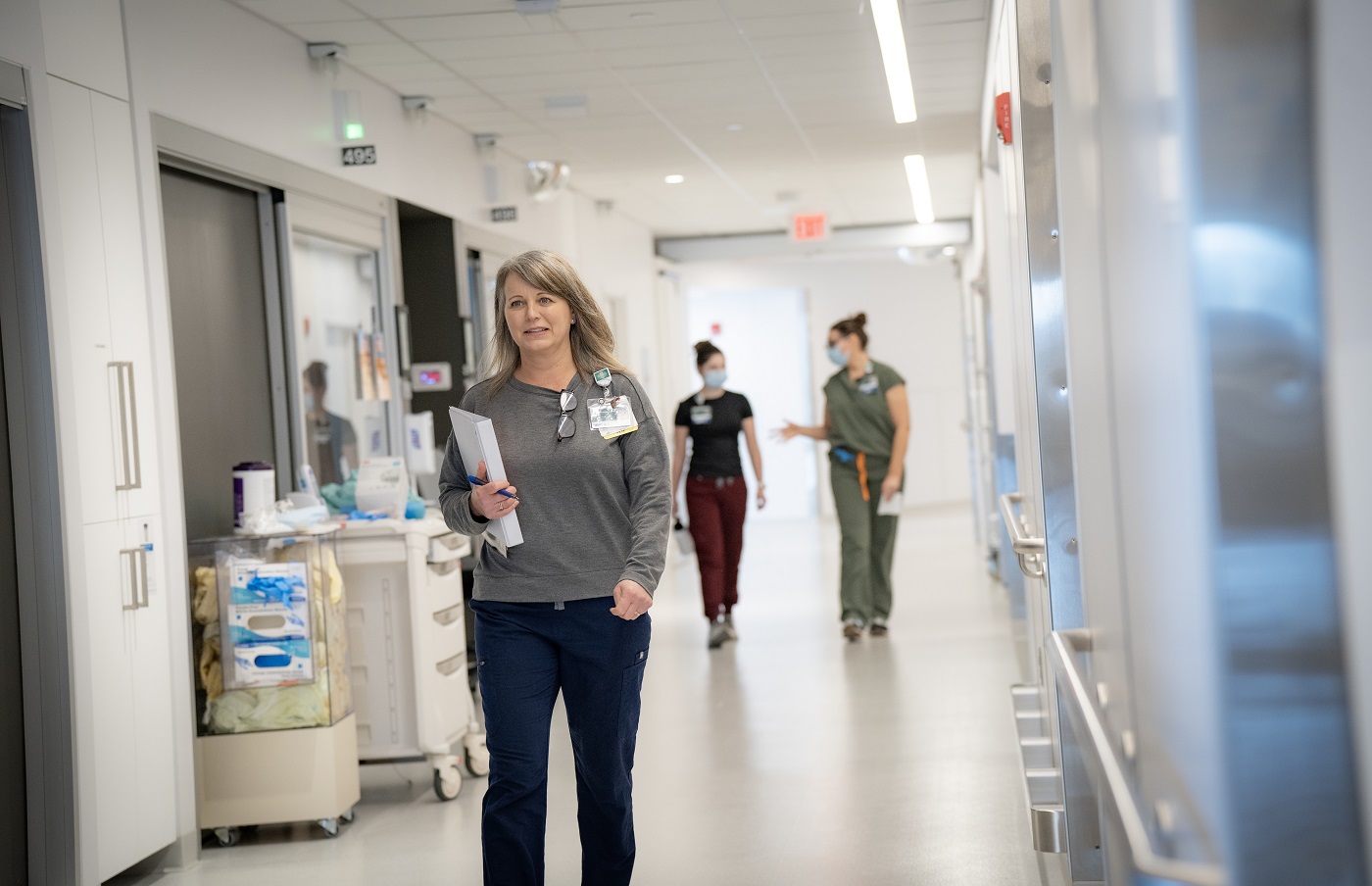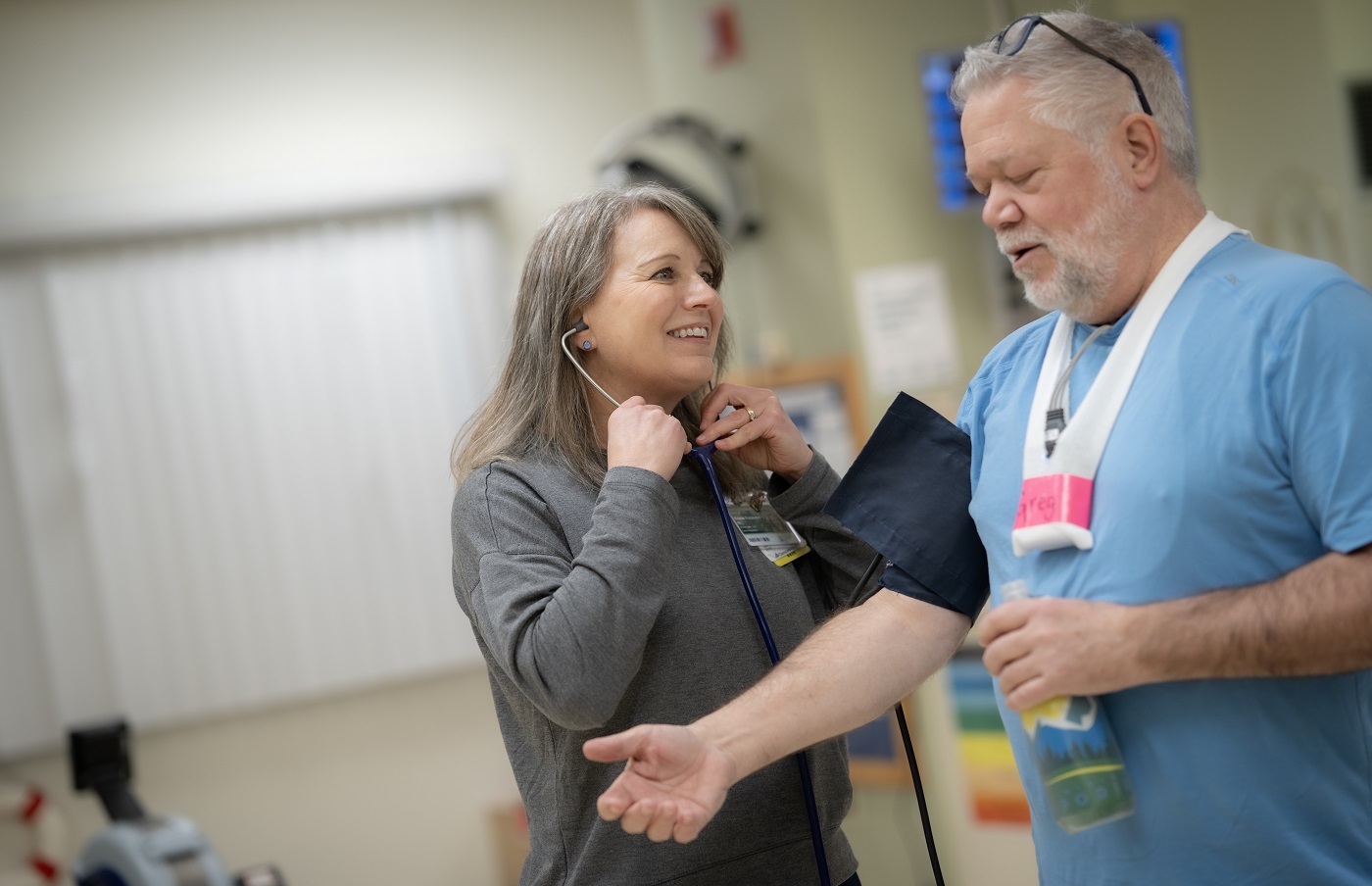
The office of nurse manager Kristen Frechette, RN, is not large by any measure. The space has three desks pressed into a tiny room that she shares with her two colleagues.
“It’s definitely tight,” says team member Hilary Scruggs, RN, who is on Frechette's team at Dartmouth Hitchcock Medical Center’s Heart & Vascular Center.
Scruggs brushes past the rows of notebooks, files, clipboards, calendars and whiteboards to what this three-member team seems proudest to show: a shelf of folded and newly designed shirts for graduating cardiac rehabilitation program participants.
For Frechette and her colleagues Scruggs and exercise specialist Katherine Chwasciak, the most gratifying work occurs outside their office with their patients. That work includes patient consultations on the hospital floor and cardiac rehabilitation sessions at their gym.
“Our goal is to give our patients the confidence to be able to go back and do the things they love,” says Frechette.
The three-phrase program
The work of “our mighty team,” as Frechette affectionately calls the trio, can be divided into three phases. The first focuses on patients who have had a stent, heart attack, heart failure, or open-heart surgery. A team member visits the patient, discusses risk-factor modifications, provides exercise guidelines, recommends a cardiac rehabilitation program close to home, and provides a referral if appropriate. During the second phase, the two remaining team members lead hour-long classes for qualifying patients at their own cardiac rehab gym. On average, each of their patients participates in 18-36 classes offered three days each week.
“Participation rates average 84%, compared to a national rate of around 30%,” Frechette says proudly.
In fact, many participants become so committed that after graduation, they return to join the third phase of the program when the gym is opened up for two 90-minute sessions weekly.
“Talk about camaraderie. Some of these people have been coming for 15-plus years. They send pictures. They all are wonderful,” says Frechette.

Gaining confidence and spreading joy
Frechette and her colleagues’ passion and commitment toward their patients is palpable and enduring.
“As a nurse, I get to see patients regain confidence and strength after their diagnosis. It’s humbling to be a part of that process,” Frechette said in 2018 when receiving Dartmouth Hitchcock Medical Center's 25-year service award.
More than five years later, Frechette's perspective remains unchanged.
“I am always overwhelmed by how grateful they are. They're so appreciative. In one of our classes, we have a guy who works the night shift doing manual labor and still makes the commitment to drive 45 minutes here three times a week. This morning, he was exercising next to a physician and an accountant, and they were all just yacking it up, having already sat out in the waiting room chatting for 15 minutes before they came in. Talk about camaraderie,” she says.
Scruggs agrees, stressing the benefits of the program they run. “It’s so motivating. They feel a responsibility to their class. They learn from one another."
“Our goal is to give our patients the confidence to be able to go back and do the things they love.”
Kristen Frechette, RN
And it’s not just the current team members whose passion and commitment endure. Frechette’s predecessor, who started the program almost 50 years ago, still regularly visits.
Concludes Frechette: "It's just exciting to be on this team."
A typical Wednesday in the rehab gym for 'The Mighty Team'
7:30 am
Frechette and her colleagues walk through the Main Entrance—a great glass, angular entryway of Dartmouth Hitchcock Medical Center, and up the stairs to their office off the gym. The space is quiet when they first arrive. The three share a tea or coffee and plan for the day. They review the census of cardiac patients currently checked into the hospital and determine who is eligible for their local rehab program. They also review the progress and status of those participating in their rehab program.

8:20 am
The music begins—an energizing playlist of rock-and-roll songs from the 1960s, '70s, and '80s. One team member leaves to conduct the hospital patient rounds. “She meets with those folks in the hospital, and we talk to them about risk factor modification. We give them exercise guidelines. Most importantly, we try to get them involved in a cardiac rehab program,” says Frechette.
The remaining two prepare the gym for the upcoming hour-long exercise classes by making sure that all equipment is wiped down, clean towels are stacked and the cloth straps participants wear are labeled with pink tape indicating the patient’s first name. Each strap has a pouch in which they place a small telemeter that monitors real-time heart data on screens displayed throughout the room.
8:25 am
The cardiac rehab patients start filing in, hanging their coats and picking up their telemetry wear. Up to 10 people arrive for one class. The two team members greet them, ask what they did for exercise the day prior, take their blood pressure, and get a sense of how everyone is doing. Patients range from their twenties to much older adults. “We also have a lot of athletes,” says Frechette.
8:45 am to 9:25 am
Class begins with 40 minutes of monitored aerobic exercise. A team member has identified patient goals and determines the appropriate exercise prescription during their first visit. Goals vary depending on a person’s profile.
“If somebody's a firefighter, I'm going to have very high goals for them in terms of their work capacity. Whereas if you're 80 years old and like to fly fish, my level goals for you will be much lower,” says Frechette.
Although the wall monitors are in view, the class is not staring at them. "I don’t want them to medicalize their life," says Frechette. "A lot of people have exercise watches that are not always accurate. Instead, we focus on something called a Perceived Exertion Scale. We adjust their exercise based on how they feel. If it's feeling light, we'll turn it up. Everything should be fine if they're in that moderate to somewhat hard zone. Cardiac rehab is not a stress test. We never want them exercising in the very heavy zone; that’s not something they can sustain. You shouldn’t have to look at your watch to find out how you feel. Such a huge part of what we do is reassurance and confidence building.”
9:25 am to 9:35 am
The team leads the group in five minutes of resistance training. Some use hand weights. Some work with their body weight. Afterward, there is a five-minute session of stretching and cooling down.
9:35 am to 9:45 am
The exercise class closes with an education session around nutrition, exercise and stress. “A lot of our people have stress and depression, particularly our surgical patients.” Today, the topic is sodium. “It's a little nugget of heart-healthy information for them to go home with,” says Frechette.
9:45 am to 10:15 am
Patients leave the room. The team members clean and prepare for the next group, review the telemetry data, write reports and grab a quick snack.
10:30 am to 11:45 am
The second group arrives with the same busy check-in. “We monitor the class with the same structure as the 8:45 class. Afterward, we clean the room and prepare it for the afternoon group,” says Frechette.

11:45 am to 1:45 pm
It’s catch-up time. The three women return to their small office and do their daily patient reports. They fill in mandatory individual treatment plans for each patient that document progress. They eat lunch, walk outside the gym, recharge, review pending referrals, catch up on administrative tasks and call patients.
1:45 pm to 3:00 pm
The third class arrives. “We have the same bumping music and great energy,” Frechette explains. “This is a very dynamic room.”
3:00 pm to 4:00 pm
The team cleans up again and fills out the remaining end-of-day reports. They organize for tomorrow and review the hospital schedule to determine whom to visit in the hospital tomorrow.